OCR today announced a ground-breaking research programme (Reality MS) with experts Professor Isabelle Fournier and Professor Michel Salzet from PRISM, an interdisciplinary laboratory within University of Lille 1, which specialises in mass spectrometry imaging (MSI). Originating from discussions with the OncoLille scientific consortium, the objective of the project is to create a prototype of a revolutionary medical device which allows surgeons to obtain real-time diagnosis of tissues and molecular analysis using a non-invasive laser instrument – “SpiderMass”. It is believed that successful initial trials on cats and dogs will quickly lead to the use of the device with humans. Dr Dominique Tierny, CEO of OCR will lead the animal model platform whilst collaborating closely with Professor Fournier who will coordinate imagery.
This research project will be carried-out in two phases: Initially, a clinical study will be carried out to identify and define the molecular profile of feline sarcoma tissues, the prognosis of which depends on surgical excision to define safe margins. Currently, it is extremely difficult to define safe margins for serious chronic diseases. This advanced medical device will allow a surgeon to extract micro amounts of tissue which can be analysed in real time, during surgery, to identify if they are healthy or not.
The second stage of the in vivo tests will consist of using a laser in regular endoscopic procedures. This non-invasive extraction of tissues from dogs with inflammatory bowel disease will determine the nature and the progress of the condition and subsequent clinical improvement and recovery. The collected data will be analysed using specifically designed software in order to identify the molecular profile and biomarkers associated with the diseases.
There is currently considerable interest in new tools for real time medical diagnostics and the OCR/PRISM partnership has been working in parallel with Dr Zoltan Takats, an expert in Medical Mass Spectrometry from Imperial College London, who has already pioneered the development of similar technologies such as the iKnife. It is hoped that this collaborative project which tests pets in the same conditions as people, will fast-track the use of this innovative real-time technology for a more rapid diagnosis in humans.
Professor Fournier is enthusiastic about the project, “Our team understands and appreciates that the canine model is of extreme interest in advancing human health and accelerating new diagnosis techniques for a variety of conditions, including cancer. Once the technology has been validated in dogs, it can be quickly applied to humans.”
Dr Tierny looks to future R&D collaborations, “We have a long-standing relationship with the mass spectrometry laboratory in Lille University and greatly respect their ground-breaking work. I hope that this is the first of many projects with Professor Fournier and her team.”
She added, “This project further validates OCR’s work in aligning advances for pet and human health, not only in the area of drug candidates but in the wider field of medical devices. We have received a lot of interest from the pharmaceutical industry about our expertise in this area and expect to announce further R&D projects this year.”



